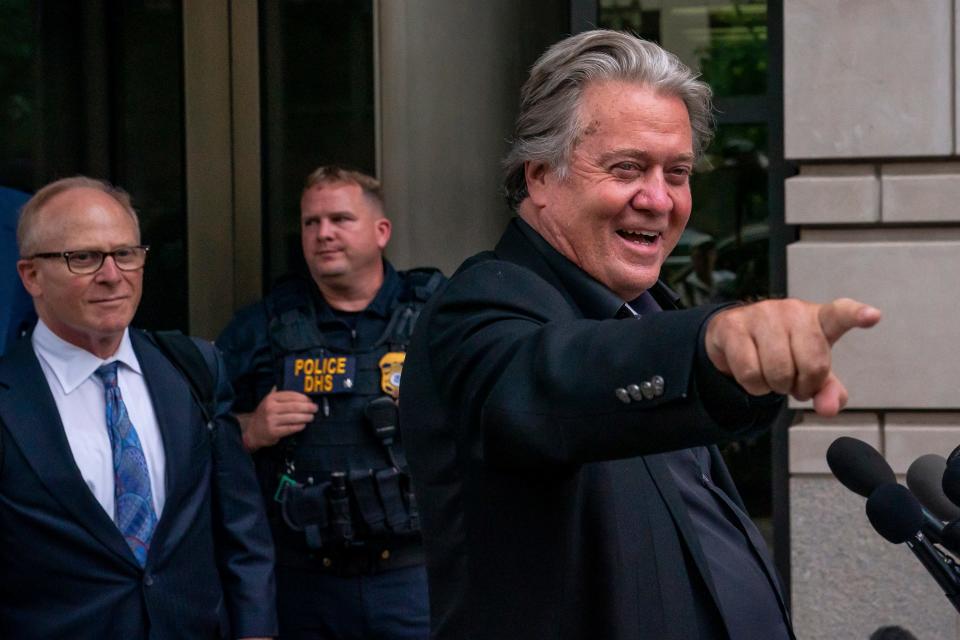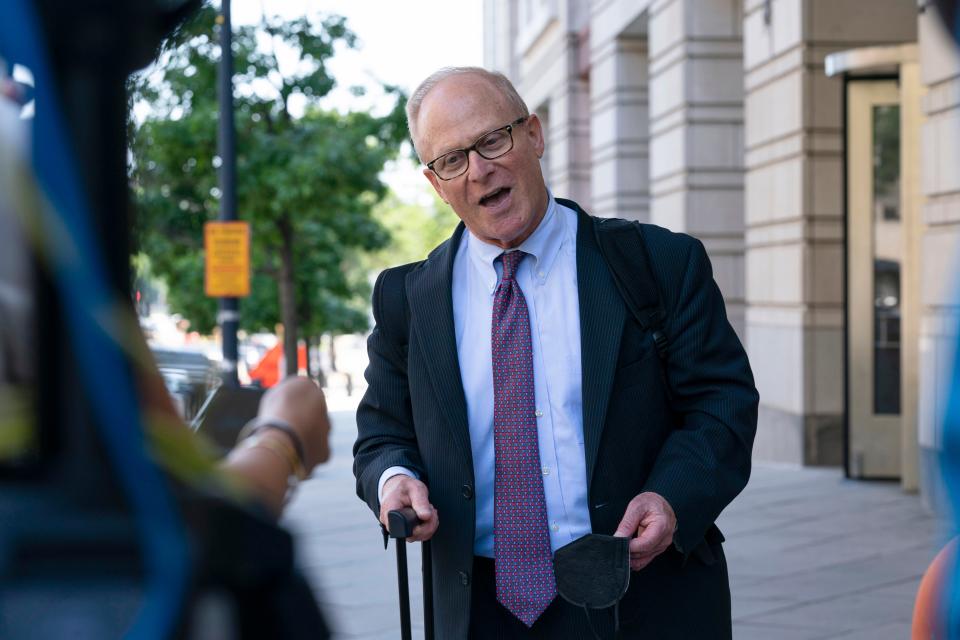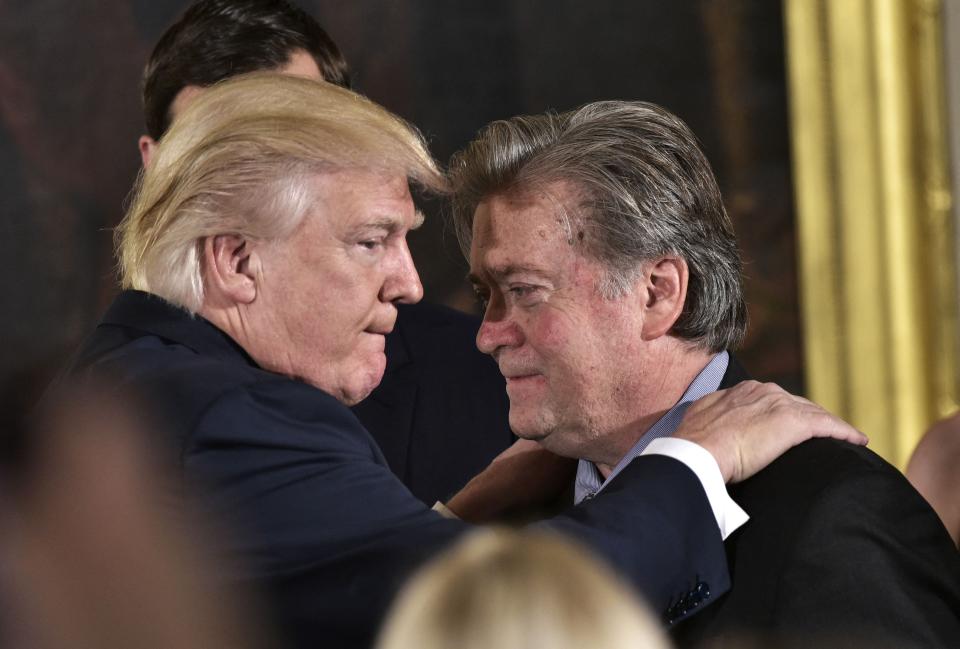Trump ally Steve Bannon found guilty of contempt for defying Jan. 6 committee subpoena
WASHINGTON – Former White House strategist Steve Bannon was convicted of contempt of Congress Friday, following a swift trial featuring just two government witnesses who detailed the longtime Donald Trump aide’s defiance of a House committee’s demand for records and testimony in its investigation of the Capitol attack.
The federal court jury deliberated less than three hours before delivering guilty verdicts on two counts, dealing victories to the special House committee which initiated the contempt proceedings and the Justice Department’s prosecution.
Sentencing is set for Oct. 21.
Appearing outside the courthouse, Bannon said he "respected" the jury's decision but vowed to appeal.
"We may have lost the battle here today, but we haven't lost the war," he told reporters, his right arm slung around attorney David Shoen.
"You will see this case reversed on appeal," Shoen said, describing the case as "bulletproof."
What did Trump do on Jan. 6?: A breakdown of the 187 minutes Trump was out of view on Jan. 6 as aides urged him to act
Government lawyers did not comment.
The Jan. 6 committee hailed the verdict as "a victory for the rule of law and an important affirmation of the Select Committee's work," in a tweet.
In closing arguments, prosecutors urged conviction, asserting that Bannon "chose allegiance to Donald Trump" over an obligation to comply with Congress.
"The defendant made a deliberate decision not to comply," Assistant U.S. Attorney Molly Gaston told jurors. "That, ladies and gentleman, is contempt. We are here because the defendant has contempt for the Congress.
"He has contempt for our system of government and does not believe he has to abide by the rules. Find him guilty."
Jan. 6 and the Secret Service: Criminal probe of Secret Service texts a 'big deal' as agency draws Jan. 6 committee scrutiny
Bannon attorney Evan Corcoran, meanwhile, continued to maintain that the House committee had targeted his client because of Bannon's long relationship with the Republican former president. He also suggested that the prosecution's primary witness harbored a political bias against Bannon.
"Why was Steve Bannon singled out?" Corcoran told the jury, turning his focus on Kristin Amerling, the House committee's chief counsel and the government's main witness.
Corcoran referred to Amerling's work for Democratic lawmakers and her acknowledged contributions to Democratic political candidates. The witness also had previously testified that she had known one of the prosecutors, Gaston, for about 15 years when they overlapped as staffers for former Rep. Henry Waxman, D-Calif. The two also have been members of the same book club.
Takeaways from Thursday's Jan. 6 hearing: Trump glued to TV, Secret Service fears, Cheney forecasts 'dam' break: Takeaways from the Jan. 6 hearing
"Why did Ms. Amerling want to make an example of Steve Bannon? It’s an election year," the attorney said.
Final arguments followed a decision by Bannon's lawyers to call no witnesses in the case. Bannon attorney David Schoen told U.S. District Judge Carl Nichols Thursday that his client decided not to testify arguing that the court had barred the legal team from asserting a number of defenses, including that Bannon was exempted from complying with the subpoena because he believed Trump had invoked executive privilege.

Bannon was convicted on two counts of contempt, one for his refusal to appear for the deposition and another involving his failure to produce documents.
Each count could carry a minimum of 30 days and a maximum of one year in jail, as well as a maximum fine of $100,000.
Federal prosecutors rested their case against Bannon Wednesday after testimony from just two witnesses, including Amerling, who told the jury the former Trump aide repeatedly defied the panel's demand for documents and testimony despite the threat of criminal prosecution.
Amerling, who serves as the committee's deputy staff director, said Bannon was put on notice multiple times that he risked contempt charges if he did not produce the required information and appear for a deposition, yet he failed to meet every deadline outlined in the Sept. 23, 2021 subpoena.
What's next for Jan. 6 committee?: Jan. 6 committee promises more hearings this fall. What we know (and don't) about what happens next
Referring to correspondence with Bannon attorney Robert Costello, Amerling said the lawyer never requested an extension of the deadlines or suggested that his client had no information relevant to the committee's inquiry. Instead, Costello argued that Bannon was shielded by executive privilege.
"The select committee's position was this was not a valid rationale for refusing to comply," Amerling said, adding that the committee never received a notice – "formal or informal" – that Trump invoked executive privilege related to Bannon.
This month, the Justice Department revealed in court documents that Trump's attorney never said the former president intended to invoke executive privilege that would shield Bannon from the committee. In January, the Supreme Court rejected Trump's attempts to shield documents from the committee through executive privilege.
In closing arguments, Corcoran claimed that Bannon had not ignored the committee's subpoena referring to the House committee's exchange of correspondence with Bannon's attorney, Costello. At one point, Corcoran challenged the validity of the subpoena, suggesting that the signature of Jan. 6 committee Chairman Bennie Thompson, D-Miss., was different from his signatures on correspondence with Bannon's attorney.

Corcoran also asserted that the dates set out in the subpoena for the production of documents and Bannon's appearance for a Oct. 14 deposition were merely "placeholders," subject to negotiation.
"The government wants you to believe that that is a paper trail to a crime," Corcoran said.
Assistant U.S. Attorney Amanda Vaughn countered Friday that the committee's demands couldn't have been "clearer."
"This is not difficult. This is not hard," Vaughn told jurors. "Your eyes are not deceiving you. He (Bannon) chose not to comply because he didn't want to."
The government's case largely hinged on Amerling's testimony, while Bannon's attorneys have repeatedly sought to cast the prosecution as politically driven.
At trial, Corcoran asked whether members of Congress were directly involved in setting the subpoena deadlines.

Amerling testified that the urgency of the investigation dictated that the committee obtain information "as expeditiously as possible."
Vaughn, however, rejected Corcoran's claim that Bannon's prosecution was politically motivated and defended Amerling as a "serious investigator."
"Why are we talking about politics?" Vaughn asked. "What is political about an attack on the seat of our government?"
This article originally appeared on USA TODAY: Steve Bannon guilty of contempt for defying Jan. 6 committee subpoena
